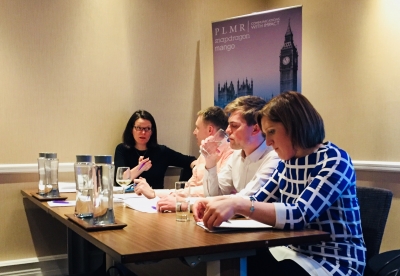Last week, we launched the PLMR and Snapdragon event series on the 2018 London Elections. An audience of highly engaged Londoners joined us for our panel discussion about what the capital might look like after polling day, which is rapidly approaching on 3rd May. As YouGov’s Joe Twyman, one of our panellists, pointed out, attendees represented a unique subset of Londoners who are actively involved and interested in local politics.
Because all 32 of London’s councils will be up for grabs on the same day, the London locals are likely to enjoy a higher profile than those in the rest of the country. By contrast, in 30 metropolitan boroughs including Bradford, Liverpool, and Sheffield, only one third of council seats are up for election. London also tends to enjoy more media spotlight – for better or for worse, depending on who you ask – so this launch event came at the right time to get everyone thinking about what’s next for the capital.
Our panel was chaired by Pippa Crerar, outgoing Evening Standard Political Editor and soon-to-be Deputy Political Editor at The Guardian. She was joined by outgoing YouGov Head of Social Research Joe Twyman, who will shortly be moving on to exciting new ventures, Buzzfeed UK’s Political Editor Jim Waterson, and Snapdragon at PLMR’s Managing Director Rebekah Paczek.
Setting the context, Pippa Crerar outlined her key boroughs to watch – Barnet, Wandsworth, Westminster, Kensington and Chelsea, and Kingston, which the Liberal Democrats are hoping to re-gain. The panel agreed that Barnet and Wandsworth are the most likely to change hands from Conservative to Labour control – and that no one, at the moment, is confident enough to call what may happen in Kensington and Chelsea in the wake of the Grenfell tragedy. While Westminster was also considered a possible Labour gain, the panel felt that Council Leader Nickie Aiken had got the Conservative campaign off to a strong start; and Bexley may prove a very interesting test for Labour to demonstrate whether it can take on the UKIP vote.
Live polls during the event revealed that for our audience, housing was overwhelmingly the key issue going into this election.
As the panel pointed out, the Conservatives are facing the problem of wanting to lower house prices across the UK but struggling to make this a reality; whereas Labour have always been elected on their promise of tackling the housing crisis, but as the controversy over the Haringey Development Vehicle (HDV) in North London shows, opinions are splitting within the Party on how this should be done in practice.
The panel agreed that the difficulties facing the Conservatives in London are at least in part due to the high profile of the national housing crisis, and that Brexit will also likely have a significant impact – not least because of London’s 1 million EU citizens, who can vote in these elections. Other issues include council tax, increasingly a political issue in the wake of Grenfell, and, in digital campaigning, the recent change to Facebook’s algorithm, which may just make it more difficult for Labour to achieve the high digital reach it had in last year’s General Election.
While it is likely too early to tell what will happen in London, especially given traditionally low voter turnout for local elections, and the many high-profile events and issues that move London’s diverse population every day, the event offered a timely glimpse of which key issues are likely to dominate the agenda as we move closer to polling day.
Follow this site for our analysis and updates on key topics, people, and places ahead of the London locals. If you would like to discuss in more detail how the London elections might impact you and your business, get in touch with the team on info@plmr.co.uk.
If you missed the event, read on below for the take on the event from some of the PLMR team who were in the audience:
Duncan Flynn, Senior Account Director, Snapdragon at PLMR: The challenge for the Conservatives is to hold as much of their ground as possible. For Labour, the challenge is twofold – to win marginal boroughs such as Barnet and Wandsworth from the Conservatives and not to have too many public divisions between moderates and Momentum, which could damage Labour’s national reputation. There was a broad consensus that housing is the number one policy issue for voters in the capital, and a sense that the Government was reluctant to take the radical steps on housebuilding required to address London’s housing crisis.
Caroline Mayberry, PR and Marketing Account Manager, Mango at PLMR: The discussion ranged from the housing crisis to air pollution, and overall it left me feeling much more prepared for the upcoming elections – not only knowing what topics I’ll be voting on but knowing which areas will be key drivers for change. The wide range of audience members cannot be understated – everyone came from different sectors and backgrounds and was keen to be involved in the discussion.
Sam Dalton, Account Executive, PLMR: The event provided a fascinating insight into the local London elections in May, and which boroughs we should be paying close attention to. It was interesting not only to learn about the potential swings from the Conservatives to Labour, but also about swings from moderate to more left-wing factions of Labour, and what this might mean for London. Overall, an excellent and highly engaging overview of the key political issues facing the capital at this pivotal time.




